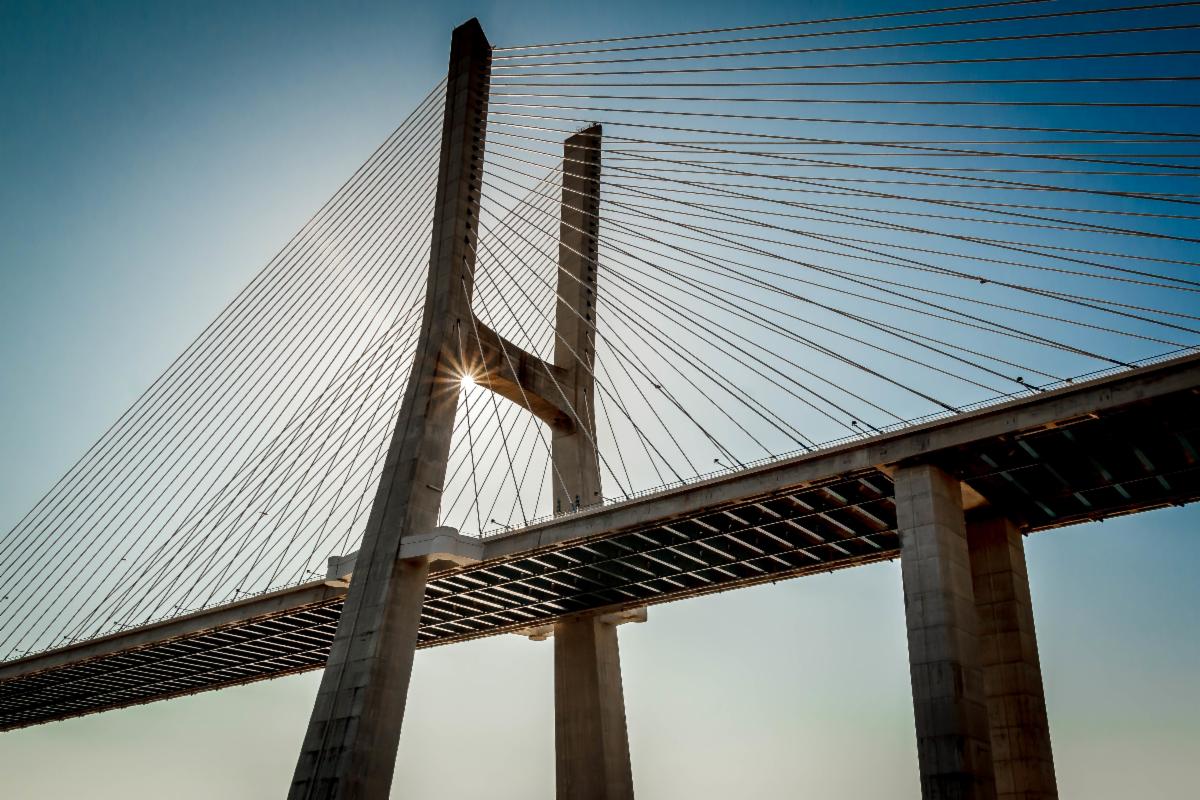…Infrastructure week turns into an infrastructure year.
Welcome back to a brand new edition of The Weekender. This week, we are following a debate in Washington that’s not just about infrastructure, but about the definition of the term itself. While we are most familiar with infrastructure week, we are now preparing for a whole year of this priority as President Biden digs in to pass his signature proposal.
We hope you are enjoying the springtime weather as we begin to see flashes of normal life. By the way, we are trying out something new this week with a poll for our readers below. We hope you like what’s in store and we encourage you to share The Weekender with your own network. Let’s dive in.
THE BIG FIVE
 What Biden means by “infrastructure” and the debate over its definition in D.C. What does “infrastructure” really mean in Washington? For many Americans roads, bridges, ports, and airports typically come to mind. But within the “once-in-a-generation” proposal, the definition may be expanding. This is the crux of the debate heating up between Congressional Democrats and Republicans, with the latter claiming that Biden’s $2 trillion proposal only allocates a small fraction on “real” infrastructure and that issues like electric transportation, energy-efficient facilities, and plumbing should not count. This week, Biden has pushed back, claiming that the economy has changed; therefore, so has the definition of infrastructure. The massive plan is aimed at not only repairing roads and bridges but also transforming the economy as we know it through education and jobs. How successfully Americans are sold on this definition may determine the trajectory of the President’s agenda. Read more in New York Times
What Biden means by “infrastructure” and the debate over its definition in D.C. What does “infrastructure” really mean in Washington? For many Americans roads, bridges, ports, and airports typically come to mind. But within the “once-in-a-generation” proposal, the definition may be expanding. This is the crux of the debate heating up between Congressional Democrats and Republicans, with the latter claiming that Biden’s $2 trillion proposal only allocates a small fraction on “real” infrastructure and that issues like electric transportation, energy-efficient facilities, and plumbing should not count. This week, Biden has pushed back, claiming that the economy has changed; therefore, so has the definition of infrastructure. The massive plan is aimed at not only repairing roads and bridges but also transforming the economy as we know it through education and jobs. How successfully Americans are sold on this definition may determine the trajectory of the President’s agenda. Read more in New York Times The next economic battle between the U.S. and China: The “Climate War” heats up. After decades of battling over what country has the leg up on trade, technology, and innovation, the world’s best-known superpowers are now getting ready for their next bout: the fight to curb climate change. Despite recent advancements in the U.S., over the past decade, China outspent America on energy transition-related investments by nearly a 2-to-1 margin, according to BNEF data. As climate change becomes the dominant theme of the coming decade, officials now believe a “climate war” between the two countries will ensue and become a main link for the balance of power. This war isn’t about saving the planet–it’s about finding the market that will lead to the next source of global supremacy for these two countries. Read more in CNBC
The next economic battle between the U.S. and China: The “Climate War” heats up. After decades of battling over what country has the leg up on trade, technology, and innovation, the world’s best-known superpowers are now getting ready for their next bout: the fight to curb climate change. Despite recent advancements in the U.S., over the past decade, China outspent America on energy transition-related investments by nearly a 2-to-1 margin, according to BNEF data. As climate change becomes the dominant theme of the coming decade, officials now believe a “climate war” between the two countries will ensue and become a main link for the balance of power. This war isn’t about saving the planet–it’s about finding the market that will lead to the next source of global supremacy for these two countries. Read more in CNBC How retailers are planning for the reopening wardrobe. After more than a year of living in sweats, many Americans are finding the courage to change out of “pandemic seasonal look” and emerge from lockdown, thanks to the increase in vaccine distribution. This change has no doubt caught the eye of clothing stores, and retail sales have started to increase from the beginning of the year. Yet, a sense of caution remains, and retailers are unsure how much the pandemic’s popular leisurewear style has really impacted the season’s fashion (and projected sales). Has the past year forever changed what we want to wear? With new clothing lines being marketed and sold, billions of dollars in inventory are at risk. Shoppers, be warned: fewer deals and availability will be the norm this year, until we decide what the reopening looks like. Read more in Axios
How retailers are planning for the reopening wardrobe. After more than a year of living in sweats, many Americans are finding the courage to change out of “pandemic seasonal look” and emerge from lockdown, thanks to the increase in vaccine distribution. This change has no doubt caught the eye of clothing stores, and retail sales have started to increase from the beginning of the year. Yet, a sense of caution remains, and retailers are unsure how much the pandemic’s popular leisurewear style has really impacted the season’s fashion (and projected sales). Has the past year forever changed what we want to wear? With new clothing lines being marketed and sold, billions of dollars in inventory are at risk. Shoppers, be warned: fewer deals and availability will be the norm this year, until we decide what the reopening looks like. Read more in Axios Security versus public access: Officials mull over safety measures at the U.S. Capitol. Can a location so critical to democracy be both secure and accessible? That’s the debate lawmakers and security officials are having after a recent incident at the U.S. Capitol resulted in the death of a Capitol police officer. This comes just three months after a mob stormed the U.S. Capitol in a deadly riot during the certification of the presidential election. The incidences have sparked high-level discussions around the ever-changing threats to Congress and the building’s security. Officials have recommended to Congress protective measures that beef up the complex’s security, including an enhanced surveillance system, bolstered entrances, more police officers, and temporary fencing. The future of the Capitol’s security will be one to watch since providing public access to the building has always been an important aspect to our Republic and the Capitol’s identity. Read more in Associated Press
Security versus public access: Officials mull over safety measures at the U.S. Capitol. Can a location so critical to democracy be both secure and accessible? That’s the debate lawmakers and security officials are having after a recent incident at the U.S. Capitol resulted in the death of a Capitol police officer. This comes just three months after a mob stormed the U.S. Capitol in a deadly riot during the certification of the presidential election. The incidences have sparked high-level discussions around the ever-changing threats to Congress and the building’s security. Officials have recommended to Congress protective measures that beef up the complex’s security, including an enhanced surveillance system, bolstered entrances, more police officers, and temporary fencing. The future of the Capitol’s security will be one to watch since providing public access to the building has always been an important aspect to our Republic and the Capitol’s identity. Read more in Associated Press How “Messy Leaders” could help navigate the new normal. 2020 was a challenging year for all of us, and it also struck a special challenge for those in leadership roles, turning everything on its head. Case in point: new research found that many who were successful leaders before the pandemic struggled once Covid-19 hit, falling victim to traps such as “superhero syndrome” and putting on a brave face for employees. Many experts say, the old “we only talk business here” leadership mentality that thrived in more stable times has gone out the door, and “messy” leadership traits, like compassion and empathy, are in. For example, if a larger company were to completely move its workforce to a remote setting, in pre-pandemic times, the process may have taken weeks, if not years. However, companies this past year transitioned to remote-work operations in a matter of days. Instead of focusing on traditional processes, leaders are focusing on outcomes to power through challenging times. Read more in Entrepreneur
How “Messy Leaders” could help navigate the new normal. 2020 was a challenging year for all of us, and it also struck a special challenge for those in leadership roles, turning everything on its head. Case in point: new research found that many who were successful leaders before the pandemic struggled once Covid-19 hit, falling victim to traps such as “superhero syndrome” and putting on a brave face for employees. Many experts say, the old “we only talk business here” leadership mentality that thrived in more stable times has gone out the door, and “messy” leadership traits, like compassion and empathy, are in. For example, if a larger company were to completely move its workforce to a remote setting, in pre-pandemic times, the process may have taken weeks, if not years. However, companies this past year transitioned to remote-work operations in a matter of days. Instead of focusing on traditional processes, leaders are focusing on outcomes to power through challenging times. Read more in Entrepreneur
DATA POINTS
- 184,000. The number of Teslas delivered in the first quarter of 2021. This number is up 2% from the year-end quarter, which had previously been the company’s record high.
- 250. The number of National Guard troops who stayed at the U.S. Capitol for two years after 9/11. Recent events have brought up similar debates on the long-term security of the building.
- 1 in 4. The number of workers who plan to look for a job at a different company once the pandemic subsides. Of those planning to leave their current job, 80% are reportedly concerned about career growth.
- 17 hours. The average duration of time between when a new billionaire was minted over the past year. The world’s wealthiest are now $5 billion richer than a year ago, with Jeff Bezos topping the list for a fourth year in a row.
- $151 billion. How much Elon Musk is worth. Musk rocketed from number 31 to number 2 as richest person in the world.
- 197.92 million. The number of Americans who use Heinz as their ketchup of choice. The U.S. is experiencing a ketchup shortage, effecting sachets rather than bottles due to a heightened demand for takeout and delivery.
- 171.5 million. The number of current daily crossings in the U.S. across 45,000 structurally deficient bridges.
- 744,000. The number of jobless claims filed this past week, which is higher than expected despite recent positive signs in the labor market.
- 241,342. The number of Americans who fell victim to phishing internet schemes in 2020. There was an estimated $1.64 billion lost from internet crimes in 2020.
TWEET
Incredible tale about the unheralded scientist whose work was at the heart of the Pfizer and Moderna vaccines.
— Cliff Levy (@cliffordlevy) April 9, 2021
She migrated from lab to lab, never making more than $60,000 a year.
“She was, in a positive sense, kind of obsessed,” Fauci says.@ginakolatahttps://t.co/gmwzOmsrMe
Have a great weekend. See you next week.


